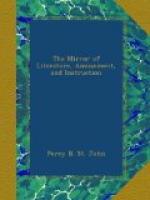Tory.—A robber, an outlaw, literally, one hunted—a name originally given to the outlawed Irish chiefs of Ulster, in the reign of James I., who after the seizure of their lands, had a price set upon their heads, and were hunted by the soldiery like wild beasts; hence the name of Tories, meaning the hunted people, for Toriacht in Irish signifies a pursuit or hunting, and Torihe, hunted. In the reign of Charles II. it began to be used to designate a party in the state favourable to absolute monarchy; many of these “Tories” having followed the fortunes of that prince in exile, returned with him, and being his most devoted partisans when reseated on his throne.
Admiral.—This word, which appears to have sadly puzzled the etymologists, having been derived from the Phoenician, the Coptic, and half a dozen languages besides, is pure Celtic, but little altered too, in its transit from one language to another. Ard, high or chief, Muir, the sea, and Fear, (in composition pronounced ar) a man, so that Ardmurar, or Admiral, signifies literally the Chief Seaman. There is nothing of torture in this derivation, as may be seen by referring to any Irish dictionary, and it is a curious fact, that the Irish seamen in the navy very generally call the Admiral “the Ardmurar.” In Irish it is frequently written in two words, thus—Ard muirfhear.
Beltin day.—The first of May is so called in many places in the North of England. It was a custom in the days of Druidism to light large fires on the tops of hills on the evening of the first of May, in honour of Bel or the Sun, and hence that day is still called in Irish, La Bheltine, or the day of Bel’s fire, from La, a day, Bel, the god Bel, and teine, fire. The same ceremony was practised in Britain, being a Druidical rite, and the name (Beltin day) remains, although the custom from which it originated, has in England, at least, been long forgotten.
Guthrie, in his “Geographical Grammar,” tells us, that the English language is a compound of the Saxon, the French, and the Celtic. As far as this latter is concerned, the assertion appears to me to have been made without due consideration; I do not believe that there are twenty words of genuine Celtic in the English language; there are, it is true, a very few Irish words, which have become as it were, English denizens, and of these I have sent you a specimen above; but I do not believe it possible to increase their number to twenty, even in broad Scotch, in which dialect of the Saxon (from the neighbourhood of the Highlanders who use the Irish language) some Celtic words might be expected, but very few occur;[2] there is, however, one very curious exception to this rule, and for which, I confess, I am unable to account, (though perhaps your correspondent, Rupert C. in No. 342, might,) it is this—that in Grose’s Dictionary of the Vulgar Tongue, or Cant Language, if the words which are evidently figurative be thrown out, nearly the whole of what remain are pure Irish.




